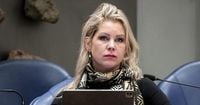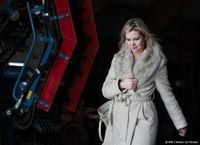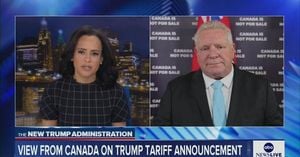On April 2, 2025, Agriculture Minister Femke Wiersma took a firm stand during a parliamentary debate, defending herself against accusations of being 'stubborn' in the ministerial committee on Economy and Nature Restoration. Wiersma asserted that her determination to uphold the interests of farmers and the agricultural sector should not be misconstrued as obstinacy. "It would not be good if I did not convincingly defend my views on my own portfolio in discussions," she stated, addressing the media reports that have circulated regarding internal disputes within the cabinet.
In recent weeks, various media outlets have reported on tensions within the cabinet, highlighting sharp discussions between Wiersma and her fellow ministers. These reports have sparked debate about the nature of leadership and gender perceptions in political discourse. Wiersma expressed her frustration with the characterization of her assertiveness, suggesting that such descriptions are gender-biased. "A male minister would be called determined for standing his ground, but I am labeled stubborn. This is, in my view, not free of sexism," she declared.
During the debate, Wiersma emphasized her commitment to achieving environmental goals while preserving the agricultural sector. "Yes, I am determined that we can achieve the goals while maintaining farmers and our agricultural sector. The values that others attach to this are their responsibility," she remarked. This determination comes amidst ongoing discussions about nitrogen reduction, a significant issue affecting the agricultural landscape in the Netherlands.
Wiersma's remarks were not only a defense of her actions but also a call for a more nuanced understanding of the challenges facing the agricultural community. She acknowledged the complexities involved in balancing environmental concerns with the needs of farmers. "It is a complicated task to find a balance here. Justice is also at play," she noted, referring to the need for equitable solutions that do not disproportionately impact farmers.
In response to inquiries from fellow parliamentarians, Wiersma outlined her approach to nitrogen reduction. She is working on plans that include company-specific emission ceilings, which farmers must achieve through targeted management and their own expertise. This strategy aims to provide a framework that allows for flexibility while still addressing environmental concerns. However, Wiersma also indicated that if specific goals are not met, additional measures may be necessary.
The ministerial committee is currently progressing along four tracks: exploring possibilities for permit granting, ensuring guaranteed nitrogen reduction and nature restoration, assessing the implications of recent rulings on internal offsetting, and focusing efforts towards Brussels and EU legislation. The urgency of these discussions is underscored by the mounting pressure from various political factions, each advocating for different approaches to the nitrogen crisis.
Members of the coalition, including VVD and NSC, have urged Wiersma to prioritize emission reduction efforts. They argue that without a strong focus on this aspect, other goals, such as restarting the permit granting process, will be unattainable. MP Jeanet Nijhof (PVV) has called on Wiersma to demonstrate courage in her decisions, emphasizing the need to address the interconnected issues of housing, agriculture, defense, and industry.
Meanwhile, Caroline van der Plas (BBB) referenced the recent visit of agricultural commissioner Christophe Hansen to the Netherlands, which highlighted concerns about the potential disappearance of millions of farmers across Europe. "We talk about rearming Europe, but we should also be discussing re-farming Europe," she stated, echoing the sentiment that agricultural sustainability is crucial for both the economy and the environment.
Wiersma is acutely aware of the challenges facing farmers, noting that she witnesses the decline in their numbers with a heavy heart. In response to the calls for a buy-out scheme, she is working on a new proposal that aims to be implemented in areas where nature restoration goals remain out of reach, even with targeted management.
As the debate continued, concerns were also raised about the plight of PAS reporters, farmers who lack valid permits due to regulatory changes. MP Harm Holman (NSC) expressed his frustration that a solution for these farmers has not yet been reached. He warned that without intervention, they could face a wave of enforcement requests from environmental action groups later this year.
Holman emphasized the need for a breakthrough, stating, "It is high time to help livestock farmers who, through no fault of their own, do not have a valid permit." He argued that sustainable farming practices should be prioritized, suggesting that farmers should not keep more livestock than their land can support. "If we do not address this with our collective effort, we will cause great damage to Dutch agriculture," he cautioned.
The urgency of the nitrogen crisis was further echoed by MP Pieter Grinwis (CU), who criticized the slow pace of progress. He urged Wiersma to take bold measures, warning that continued delays could inflict significant harm on both the economy and the agricultural sector. "We are causing great damage if we delay any longer," he asserted.
As discussions unfold, the political landscape remains charged with varying opinions on how best to tackle the nitrogen issue. While some advocate for immediate action and stringent emission policies, others caution against measures that could jeopardize the agricultural community's viability.
Wiersma's commitment to finding a balanced approach reflects the complexities of navigating environmental policy while supporting the agricultural sector. The outcome of these discussions will not only shape the future of farming in the Netherlands but also influence broader conversations about sustainability and economic resilience in the face of environmental challenges.







